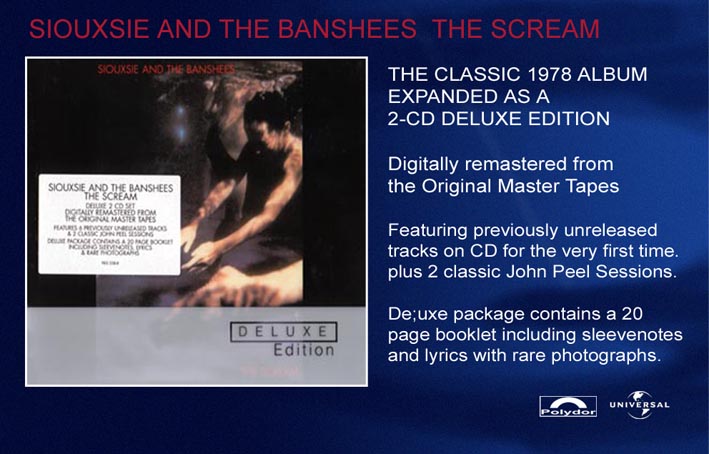 REISSUE OF THE WEEK
REISSUE OF THE WEEK
Princess of wails
Lovingly repackaged debut still has bite 27 years on.
Sometimes, watching the footage of the Sex Pistols-swearing-on-ITV incident alongside John Lydon making his bulging-eyed way round the current chatshow circuit, it's tempting to conclude that nobody involved has moved on much from 1976, either creatively or intellectually.
It's a false impression, though, as this re-release of Siouxsie & The Banshees' debut shows. By the time it made its first appearance back in November 1978, Sioux had already left behind the toybox pallet of punk - swearing, swastikas and simple pogo-friendly riffs - and was busy inventing post-punk. While punk's Year Zero mentality meant bands were tossing the Bolan out with the Roger Waters, the Banshees were happy to raid pop culture for starting points. Their cover of The Beatles' 'Helter Skelter', which could put the fear of God into Charles Manson, nevermind Ringo Starr, provides a pretty good example of how far they were able to travel from that inspiration.
So fresh does 'The Scream' sound, even now, that it's much easier to see its impact on those that came after, than trace where the hell all the ideas came from. Of course there's Banshee DNA running through any band which has ever back-combed (you will know them by the trail of the heavily applied mascara), from Bauhaus through the Mary Chain to The Cure, but the echoes run beyond the obvious mini-Shees of the goth world. Every time Karen O uses her voice like it was percussion, or Polly Jean Harvey hits you around the head, there's a small debt to 'The Scream' being run up.
'The Scream. is leading off a procession of Banshees re-releases over the coming 12 months or so, and in a world where it's easy to assume there's nobody left on a major label who much cares about music, it brings a tear to the cynical eye to see just how much care has been lavished on the package. The original collection of tracks has been given the expected digital remastering, but, more importantly, a second disc of stuff actually worth having has been gently eased into the slipcase. You get two complete Peel Sessions from '78 and the demo debuts of some of 'The Scream' tracks. 'Hong Kong Garden', the Top 10 hit left off the collection in a fit of something between petulance and perversity is welcomed back and, for the first time ever on anything approaching an official basis, 'Make Up To Break Up'.
Back on the '70s, 'The Scream' was the perfect riposte to those who suggested the punk movement had none of its own ideas to replace the chugging old bands it came to destroy. In 2005, set alongside the Blunts, Gallaghers and Bonos we're lumbered with, it still sounds like a promise of a gathering storm. Simon Hayes Budgen
WHAT NME SAID
January 14, 1978
"Siouxsie's voice is staggered. No orthodox fluid melodies, but clipped, forced lines, sharply falling and rising. She displays no exhaustion or any other colourful sideshows that performers so often find in themselves. From the dark side of life, grinning, perverted, subversive; euphoria and depression, vision and pessimism mysteriously co-exist." Paul Morley
WHY I LOVE SIOUXSIE....
SHIRLEY MANSON, GARBAGE
"Women in the charts up to that point had been presenting a glossy, sanitised version of femininity - wearing little rah-rah skirts with their bellies hanging out. But Siouxsie, with her face painted with that tribal make-up, she came along looking like a warrior."
ANA MATRONIC, SCISSOR SISTERS
"Her influence cannot be understated. In my record collection there's Siouxsie & The Banshees' entire back catalogue."